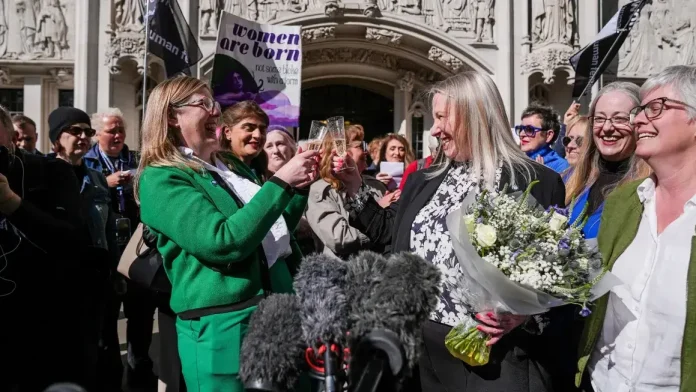In a significant legal ruling, the United Kingdom’s Supreme Court has determined that under the Equality Act 2010, the term “woman” refers exclusively to biological sex. The unanimous judgment effectively excludes transgender women from the legal definition of “woman” in certain contexts, such as single-sex spaces and provisions.
The case was brought forward by campaign group For Women Scotland, which challenged Scottish government guidance that included transgender women with Gender Recognition Certificates (GRCs) under the legal category of women. The group argued that such inclusion risked undermining the rights and protections of biological women in areas like women-only changing rooms, hostels, and shortlists.
Speaking on behalf of the court, Lord Patrick Hodge stated: “The terms ‘woman’ and ‘sex’ in the Equality Act 2010 refer to biological women and biological sex. Provisions related to sex discrimination can only be interpreted through that lens.”
He explained that interpreting “sex” to include certificated gender could lead to inconsistencies in the law, especially in areas like maternity rights and pregnancy protections. However, the ruling reaffirmed that transgender people remain protected under the characteristic of “gender reassignment” in the Equality Act.
Supporters of the ruling, including gender-critical groups and some political figures, celebrated the decision as a victory for women’s rights. Outside the court, For Women Scotland representatives Susan Smith and Marion Calder called the ruling a major step in preserving sex-based protections.
A spokesperson for the UK government welcomed the decision, stating: “This ruling brings clarity and confidence for women and service providers such as hospitals, refuges, and sports clubs. Single-sex spaces are protected in law and will continue to be protected by this government.”
The advocacy group Sex Matters echoed this sentiment, saying: “The court has given the right answer. The protected characteristic of sex—male and female—refers to reality, not paperwork.”
The LGB Alliance described the ruling as a “watershed moment for women’s rights,” while former SNP MP Joanna Cherry said it was “hugely vindicating” and urged lawmakers to align all legal guidance accordingly.
However, LGBTQ+ and trans rights groups expressed alarm. Stonewall, the UK’s leading LGBTQ+ charity, called the ruling “deeply worrying,” warning that it may further marginalize transgender people. Scottish Trans, another advocacy group, advised the trans community to stay informed but calm, cautioning against panic in response to potentially overstated media narratives.
The decision comes at a time of heightened concern for trans rights in the UK. Hate crimes related to gender identity rose by 112% in 2023, and the murder of 16-year-old trans girl Brianna Ghey last year sparked national mourning and renewed calls for better protections.
Globally, similar debates are unfolding. In the U.S., former President Donald Trump signed an executive order barring transgender girls and women from competing in sports consistent with their gender identity, prompting a fresh wave of legal challenges.
As the UK ruling reverberates both legally and culturally, the conversation around gender, rights, and the law continues to draw strong reactions from all sides.












